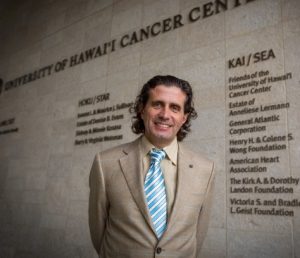When Dr. Michele Carbone arrived in the United States during the mid-1980s, he worked as a Visiting Fellow at the National Institutes of Health in Bethesda. There were almost a hundred other fellows from Italy, and they elected Dr. Carbone as their representative at the Italian Consulate Hawaii during the visit of the Italian President Francesco Cossiga.  Soon after, the Italian Embassy appointed him as their official Medical Doctor. That was a lot of fun: Dr. Carbone met many very interesting people, and it was the beginning of a long collaboration with the Foreign Ministry of Italy.
Soon after, the Italian Embassy appointed him as their official Medical Doctor. That was a lot of fun: Dr. Carbone met many very interesting people, and it was the beginning of a long collaboration with the Foreign Ministry of Italy.
When Dr. Carbone moved to Chicago in 1994, the Italian Embassy put him in contact with the Consul of Italy there, and he became the scientific and medical advisor for the Consulate. Together, they organized several events.
In 2001, Dr. Michele Carbone was awarded a Cavaliere della Repubblica Italiana—an honorary Knighthood for his scientific achievements.
Both of his parents came from Italy for the ceremony and reception, and Dr. Carbone is always grateful to Italy for providing him the education that allowed him to become a physician and scientist.
In 2006, Dr. Michele Carbone moved to Hawaii, and a few years later he received a call from the Italian Embassy in Washington, DC asking him to take on the job of Vice Consul of Italy for Hawaii. Dr. Carbone accepted under the condition that the title was changed from “Vice Consul” to “Honorary Consul.” They agreed, and then the other bureaucratic matters got underway. A year later (2010), Dr. Carbone received a second call from the Embassy, informing him that the procedure had been approved, and he was being nominated to serve at the Italian Honorary Consulate. Dr. Carbone had to accept.
The job, he was told, came with no salary, but Italy offered reimbursement for some expenses. Dr. Michele Carbone decided to turn down the reimbursement and made that a condition of his acceptance. Italy is a social-democracy where schools and University are basically free: he paid about $150 dollars per year to attend medical school in Rome! So Dr. Carbone thought whatever expenses and work he would do as Honorary Consul was a way to pay back to Italy what Italy had done for me.
The Honorary Consul “job” is relatively simple: Dr. Michele Carbone needs to represent Italy when dignitaries visit Hawaii, for major business reasons—such as the Hawaii rail project—and he provides visa assistance to the students, military personnel, and other individuals who travel to Italy to study or live in Italy.
Many people do not know that not only do they work “for free,” but also pay all the expenses associated with the Italian Consulate Honolulu. Sometimes they call and “demand” this or that. Dr. Carbone and his wife, who graciously helps him run the Consulate, try to explain them that they do this service on their free time and this is not a “paid job.” They may not have a staff to address all the requests they get. Dr. Carbone and his wife do what they can, with the critical help of the Consulate of San Francisco, which has been very supportive.